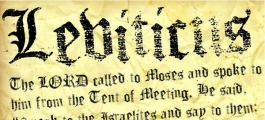Book of Leviticus
Author: Moses was the author of the Book of Leviticus.
Date of Writing: The Book of Leviticus was written between 1440 and 1400 B.C.
Purpose of Writing: Because the Israelites had been held captive in Egypt for 400 years, the concept of God had been distorted by the polytheistic, pagan Egyptians. The purpose of Leviticus is to provide instruction and laws to guide a sinful, yet redeemed people in their relationship with a holy God. There is an emphasis in Leviticus on the need for personal holiness in response to a holy God. Sin must be atoned for through the offering of proper sacrifices (chapters 8-10). Other topics covered in the book are diets (clean and unclean foods), childbirth, and diseases which are carefully regulated (chapters 11-15). Chapter 16 describes the Day of Atonement when an annual sacrifice is made for the cumulative sin of the people. Furthermore, the people of God are to be circumspect in their personal, moral, and social living, in contrast to the then-current practices of the heathen roundabout them (chapters 17-22).



 100%
100%



